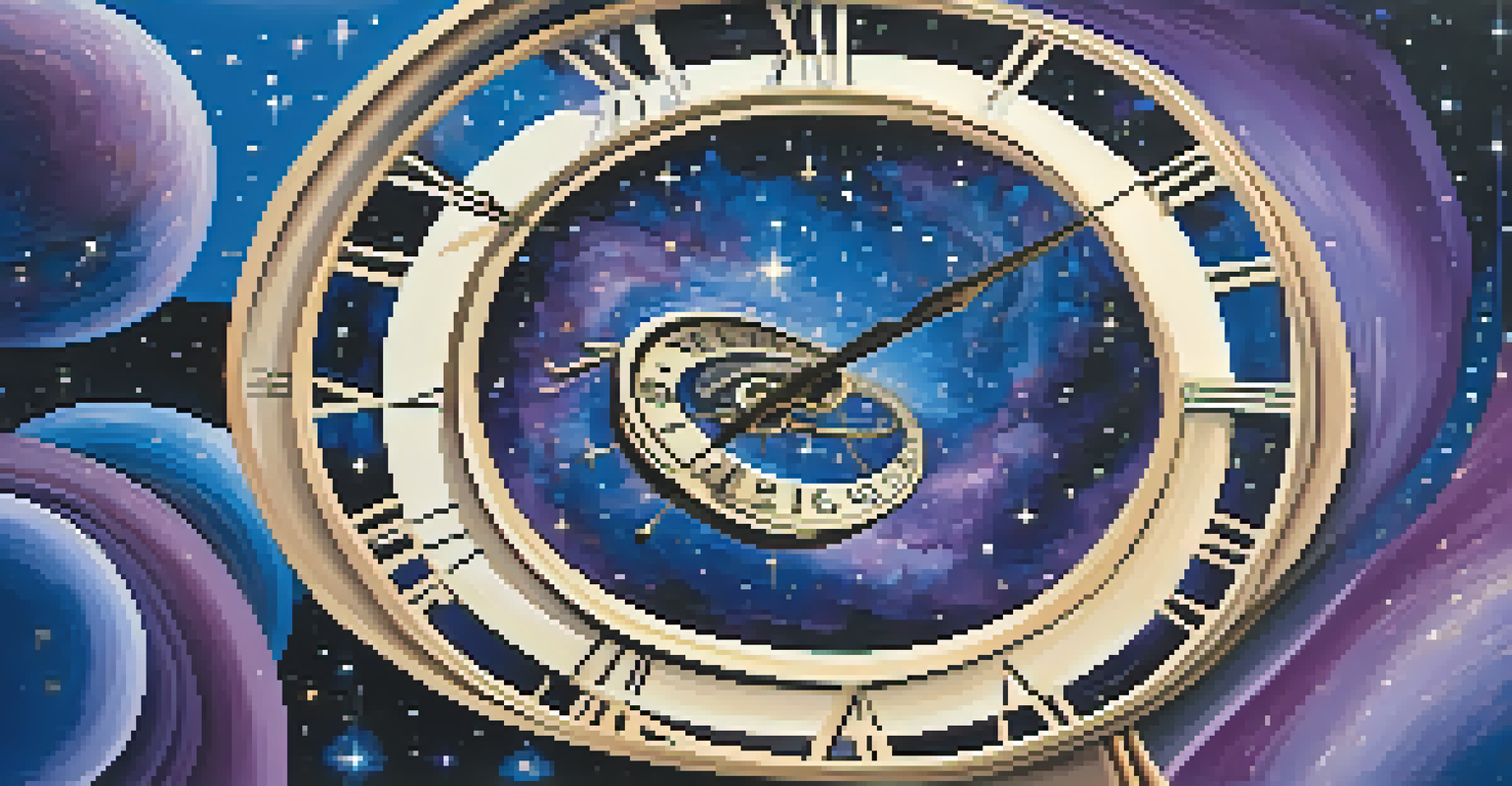Entheogens and Time: A Journey Through Altered Perceptions

Understanding Entheogens: A Brief Overview
Entheogens are substances, often derived from plants, that are used in a spiritual or religious context to induce altered states of consciousness. They have been utilized by various cultures for centuries, serving as tools for deep introspection and connection to the divine. Common examples include psilocybin mushrooms, peyote, and ayahuasca, each offering unique experiences. By examining these substances, we can start to understand their role in shaping human perception, particularly regarding time.
Time is a created thing. To say 'I don't have time,' is like saying, 'I don't want to.'
The concept of entheogens is closely tied to the idea of transcendence, allowing users to step beyond the boundaries of ordinary thought. This journey often leads to profound insights and a sense of interconnectedness with the universe. As we explore how these substances impact our experience of time, we discover that our usual linear understanding may not apply in altered states. This realization opens the door to new perspectives on existence and reality.
Ultimately, entheogens challenge our everyday perceptions and prompt us to question the nature of time itself. By engaging with these substances mindfully, many users report a feeling of timelessness during their experiences. This exploration can lead to significant personal transformation, as time becomes fluid, and moments stretch or compress in ways that defy ordinary understanding.
The Nature of Time: A Philosophical Perspective
Time is often perceived as a rigid, linear progression from past to present to future. Philosophers have debated its nature for centuries, with some arguing that time is an illusion, while others see it as a fundamental aspect of reality. In the context of entheogens, our perception of time can shift dramatically, allowing us to experience moments in a way that feels both expansive and condensed. This philosophical inquiry invites us to reconsider how we relate to time in our everyday lives.

When under the influence of entheogens, many report a profound sense of being fully immersed in the present moment. This experience can evoke feelings of eternity, where past and future blur into an all-encompassing now. Such shifts challenge the conventional understanding of time, revealing its subjective nature. It's as if these substances allow us to step outside the clock's ticking and engage with existence on a deeper level.
Entheogens Alter Time Perception
Entheogens can significantly reshape our understanding of time, allowing users to experience moments as expansive or condensed.
This exploration of time through entheogens serves as a reminder that our perceptions are not fixed. Instead, they can be reshaped and reconsidered, leading to a richer understanding of our experiences. By questioning the linearity of time, we open ourselves up to a more holistic view of reality, one that acknowledges the complexity of our lived experiences.
Psychedelic Experiences: Time Dilation and Compression
One of the most striking aspects of entheogenic experiences is the phenomenon of time dilation and compression. Users often report that minutes can feel like hours, or vice versa, creating a sense of disorientation. This altered perception can lead to a deeper exploration of thoughts and emotions, as time seems to stretch in a way that allows for profound insights. The implications of such experiences can be transformative, as individuals gain new perspectives on their lives.
The only reason for time is so that everything doesn't happen at once.
For example, during a psychedelic journey, someone might revisit a past memory with such intensity that it feels as though they are reliving it in real-time. This ability to access and process memories in a non-linear way can lead to significant emotional healing. Users often describe the experience as liberating, freeing them from the constraints of ordinary time, allowing for a more thorough understanding of their past and its impact on their present.
Conversely, the compression of time can create moments of intense clarity, where insights come flooding in, seemingly all at once. These experiences can lead to epiphanies that might take years to comprehend in a conventional mindset. By embracing these altered perceptions of time, individuals can tap into deeper layers of consciousness, leading to greater self-awareness and personal growth.
Cultural Significance of Time and Entheogens
Throughout history, various cultures have recognized the significance of entheogens in exploring altered states of time perception. Indigenous societies often incorporate these substances into rituals and ceremonies, viewing them as sacred tools for connecting with the spiritual realm. In these contexts, time is less about minutes and hours and more about cycles, seasons, and the interconnectedness of all life. This holistic approach to time can provide valuable insights into how we understand our place in the universe.
For example, in many shamanic traditions, the use of entheogens is seen as a way to commune with ancestral spirits or gain guidance from higher powers. Participants often report experiences that transcend time, engaging with past, present, and future in a unified experience. This cultural lens emphasizes the importance of understanding time as a fluid concept, shaped by our experiences and beliefs.
Cultural Views on Time and Healing
Many cultures integrate entheogens into rituals, viewing them as sacred tools that reveal the cyclical and interconnected nature of time.
By examining these cultural narratives, we can appreciate how entheogens serve as gateways to understanding time differently. They invite us to reflect on our own relationship with time and inspire us to embrace a more expansive view. Recognizing this cultural significance enriches our understanding of how altered perceptions of time can influence both personal and collective experiences.
Scientific Insights: How Entheogens Affect Perception of Time
Recent scientific studies have begun to explore how entheogens impact our perception of time on a neurological level. Research indicates that these substances can alter brain activity in ways that disrupt our typical timekeeping mechanisms. For instance, certain psychedelics may affect areas of the brain responsible for processing sensory information, leading to altered temporal experiences. This growing body of research offers valuable insights into the complex relationship between our biology and our perception of time.
One fascinating study found that participants under the influence of psilocybin reported feeling as though time was slowing down. This sensation can be attributed to changes in the way the brain processes information and integrates sensory experiences. By understanding these neurochemical changes, researchers hope to unlock the mysteries of how our brains construct the experience of time and consciousness.
As science continues to delve into the effects of entheogens, we gain a clearer picture of how these substances can reshape our relationship to time. This knowledge not only enhances our understanding of psychedelic experiences but also has potential implications for mental health treatments and personal development. By bridging the gap between science and spirituality, we can more fully appreciate the profound impact of entheogens on our perception of time.
Personal Transformations: Time and Introspection
Many individuals who have engaged with entheogens report significant personal transformations, particularly in their relationships with time. These experiences often lead to deep introspection, allowing users to confront unresolved issues and gain clarity about their life choices. By experiencing time in a nonlinear fashion, individuals can see their lives from a fresh perspective, leading to newfound wisdom and understanding. This aspect of entheogenic experiences can be profoundly healing and empowering.
For instance, someone may revisit a pivotal moment in their life, recognizing patterns they had previously overlooked. This insight can lead to a re-evaluation of their current path and inspire positive change. The ability to perceive time differently allows for a more comprehensive understanding of oneself, fostering personal growth and self-acceptance.
Science Explores Time and Psychedelics
Recent scientific studies indicate that entheogens alter brain activity, disrupting typical timekeeping mechanisms and offering insights into time perception.
Ultimately, the journey through altered perceptions of time can serve as a catalyst for transformation. By embracing these experiences, individuals can cultivate a deeper sense of purpose and connection to themselves and others. This newfound awareness can ripple out, influencing how they navigate their lives long after the experience has ended.
Integrating Insights: Living with Altered Perceptions of Time
After experiencing altered perceptions of time through entheogens, many individuals seek ways to integrate those insights into their daily lives. This process can be both challenging and rewarding, as it involves reconciling the profound experiences with the demands of everyday existence. Mindfulness practices, such as meditation or yoga, can help individuals maintain a sense of connection to the present moment, fostering a deeper appreciation for time's fluid nature.
Additionally, journaling about the entheogenic experience can provide clarity and reinforce the lessons learned during the journey. Writing allows individuals to articulate their thoughts and feelings, creating a tangible reference for future reflection. By capturing these insights on paper, they can continue to explore their relationship with time and consciousness.

Ultimately, integrating these experiences requires patience and self-compassion. As individuals navigate their lives with a renewed perspective, they may find that their relationship with time evolves, leading to a richer, more meaningful existence. By embracing the lessons learned through entheogens, we can cultivate a deeper understanding of ourselves and our place within the tapestry of life.